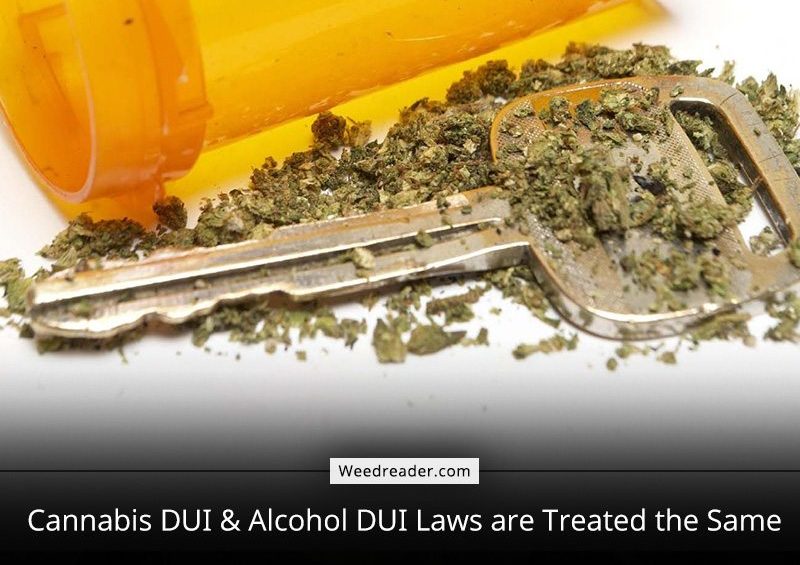In many states, cannabis DUI laws are treated like alcohol DUI laws.
But a cannabis DUI and an alcohol DUI should be treated differently for many reasons. One example of their difference is how THC and alcohol levels are metabolized. THC stays in the body for weeks after consuming while alcohol is purged in several hours. Yet the highs last about the same amount of time.
Getting pulled over weeks after smoking results in drivers getting charged with a DUI. That’s because it’s difficult for cops to determine how recently a driver smoked a bowl. Traditional sobriety tests don’t correspond to cannabis effects either. For example, a stoned driver can stand on one leg while a drunk driver cannot.
Scott Leist was a Seattle police officer, and a defense attorney for the Washington Traffic Defense. Leist agrees that Washington’s Cannabis DUI laws are a problem. In Washington, there is a .08 limit for alcohol and THC, but THC is nothing like alcohol.
Leist said, “some studies suggest that driving with moderate levels of THC in one’s system can actually improve driving performance.” There is simply no good science about what determines impaired driving with weed and what doesn’t.
THC doesn’t metabolize quickly and completely like alcohol.
Leist found that alcohol can metabolize quickly, meaning that it is easy to test when the last time alcohol was consumed. Marijuana is different because a person can consume weed and be impaired for a few hours. But THC stays in the system long after the consumption and high phase.
How quickly and completely THC metabolizes depends on a few factors. Namely; how it was consumed and when, how often the person consumes, and the potency of the substance. Small amounts of THC can be found days or even weeks after consumption. At the other end, a heavy consumer can test over the 5ng/mL limit long after they are sober.
Alcohol has more exact prediction than weed. What is the marijuana equivalent of two beers? How much THC at what age and weight will get a person to 5ng/mL levels? How fast does THC wear off for each person? Nobody knows the answers to these questions because cannabis research is hampered by federal scheduling. Alcohol has no scheduling restrictions to prevent accurate studies so much more research is available.
There are no accurate field sobriety tests for THC intoxication.
Police Officers don’t have a lot of experience or training for marijuana DUI detection’s. Smell alone is not a good clue for recent intoxication. Physical signs like red eyes is not enough to prove that a person is THC impaired.
There are a variety of reasons a driver might experience the ‘signs of THC intoxication’. A person crying or struggling with allergies causes red eyes. Fatigue can also reproduce the short-term memory issues associated with weed.
The best method cops have available is a warrant granted blood test. But blood tests don’t reveal when the last time the driver consumed weed. Unlike alcohol, there is no way to check if a person has had too much THC. There is no breathalyzer that would reveal THC impairment. A person can’t give themselves a field sobriety test like the alcohol tests.
Abby McLean drove sober and received a DUI.
Northglen, Colorado resident Abby McLean went through a DUI roadside checkpoint on her way home. She is 30, had nothing to drink or smoke that night and had no worries. When the cop walked up to her car he saw that she had blood shot eyes and smelled weed in the car.
The cop pulled out his handcuffs to arrests McLean when she exclaimed that she was on her way home to her children. McLean was forced to take a blood test which tested positive for THC intoxication. Her blood test was 5 times over the legal limit. She didn’t go to jail that night but she did go to court. It was a hung jury, but McLean settled for a lesser punishment.
Mark Kleiman is a professor of public policy at New York University. Kleiman said, “you can be positive for THC a week after the last time you used cannabis. Not subjectively impaired at all, not impaired at all by any objective measure, but still positive.”
It didn’t matter that McLean hadn’t smoked at all that night. If she smoked a week ago, she still got a cannabis DUI. Denver, Colorado’s District Attorney Mitch Morrissey says that Colorado won’t completely throw out the THC blood test. He then explained how it gives courts an extra piece of evidence during trials.
How to travel with cannabis in the car.
Scientists at UCSD are researching a new generation of cannabis field sobriety tests. One of these tests is called critical tracking. A person moves their finger around a square on a tablet to measure time distortion, because time can slow down when a person is high.
There is still a long way to go before an accurate field sobriety test exists. Tests like critical tracking are still in their experimental phase. But the nation is in desperate need for an accurate cannabis sobriety test.
Leist advises that drivers keep their weed in the trunk or in other inaccessible parts of the car. Crossing state borders with weed can result in significantly higher penalties and fines. Drivers should try to remember what they have stashed in their glove box. And don’t consume while driving or you will get a cannabis DUI .





